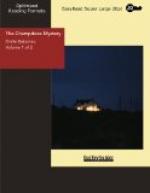He had, however, not much time for reflection, for he had to gather up every link of evidence. How was it that this accident had occurred? The frame of the window had fallen out with Andre, and lay in fragments on the pavement. He picked up one of the pieces, and at once saw what had been done; the woodwork had been sawed almost in two, and the putty with which the marks of the cuts had been concealed still clung to the wood. Palot called one of the workmen, who appeared to be more intelligent than his fellows, pointed out the marks to him, and bade him gather up the fragments and put them in some place of security. This duty being accomplished, Palot joined the crowd; but he was too late, for Andre had been taken away to the hospital. He looked around to see if there was any one from whom he could gain information, and suddenly perceived on a bench some one whom he had often followed. It was Toto Chupin, no longer clad in the squalid rags of a day or two back. He was dressed in gorgeous array, but his face was livid, his eyes wild, and his lips kept moving convulsively, for he was a victim to a novel sensation—the pangs of remorse—and was meditating whether he should not go to the nearest police-station and give himself up, so that he might revenge himself on Tantaine, who had made him a murderer. For a moment the idea of arresting Toto passed through Palot’s mind, but he, after a moment’s thought, muttered,—
“No; that would never do. We should risk losing the whole gang. Besides, he can’t get away. I may even have committed an error in arresting that woman. My master will say that I am not to be trusted. He placed one of his friends in my charge, and this is what has happened. I knew that the young man’s life was in deadly peril, and yet I let him enter a house in the course of erection; why, I might as well have cut his throat myself.”
In a terrible state of anxiety, Palot presented himself at the hospital, and asked for the young man who had just been brought in.
“You mean Number 17?” returned one of the assistant-surgeons. “He is in a most critical state; we fear internal injuries, fracture of the skull, and—in fact, we fear everything.”
It was two days before Andre recovered consciousness. It was midnight when he first woke again to the realities of life. At a glance he guessed where he was. He felt pain when he endeavored to turn over, but he could move his legs and one arm.
“How long have I been here, I wonder?” he thought.
He tried to think, but he was weak, and thoughts would not come at his command, and in a few seconds he dropped off to sleep again; and when he awoke, it was broad day; the ward was full of life and motion, for it was the hour of the house surgeon’s visit. He was a young man still, with a cheerful face, followed by the band of students. He went from bed to bed, explaining cases, and cheering up the sufferers. When Andre’s turn came, the surgeon told him




